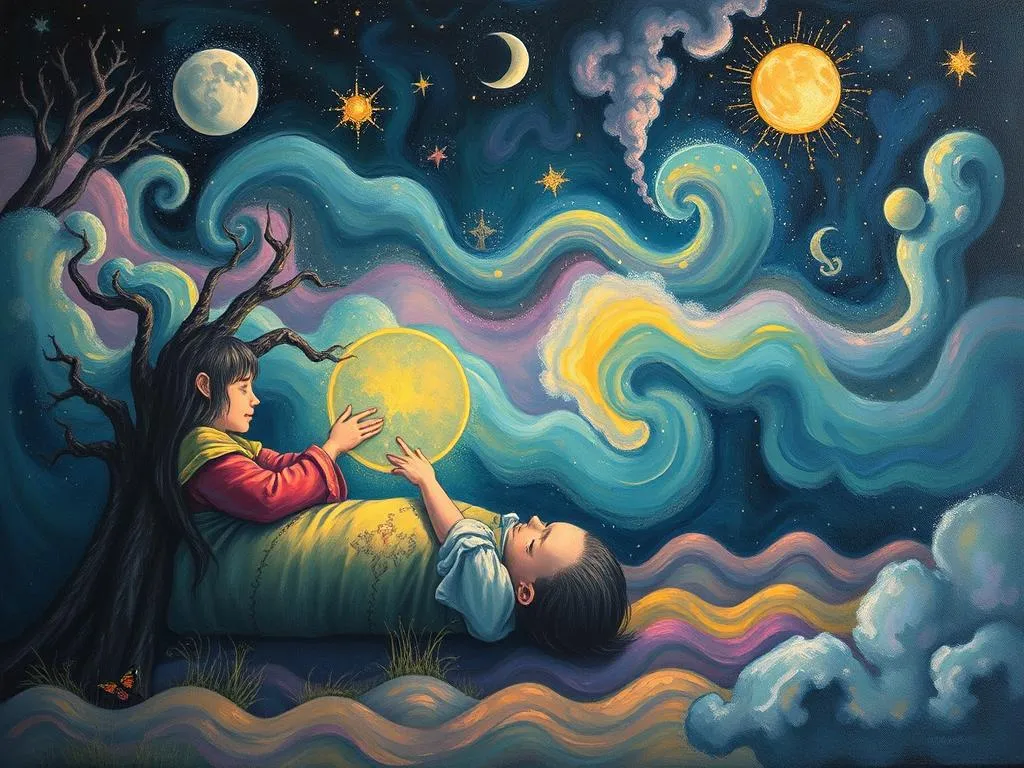
Have you ever woken up in a cold sweat, your heart racing from a nightmarish dream that seemed all too real? You’re not alone. Bad dreams can leave lingering feelings of anxiety and fear, often shaking us to our core. They challenge our perceptions of safety, reality, and even ourselves. But what if these unsettling experiences hold messages worth deciphering? What if they are reflections of our inner struggles, fears, and desires?
In this exploration of bad dreams, we will unravel the symbols woven into our nighttime narratives, discuss various experiences that haunt many dreamers, and ultimately discover pathways for personal growth. Understanding the meanings behind our nightmares can not only provide insight but also empower us to confront and overcome our waking challenges.
Shadows in the Night: Unpacking the Symbols
Every element in a bad dream is a symbol—a representation of our subconscious thoughts and emotions. By identifying these symbols, we can better understand what our mind is trying to communicate. One common symbol in bad dreams is chase, which often signifies a feeling of being pursued by unresolved issues or fears. Perhaps you’re running from a looming deadline, an unfulfilled ambition, or even a relationship that’s gone awry.
Another prevalent symbol is loss. Dreams featuring the death of a loved one or the loss of an essential item can indicate a fear of change or a sense of helplessness. The loss of control in these dreams reflects our inability to confront certain life transitions.
Additionally, claustrophobia is a frequent theme. Dreaming of being trapped in a small space may point to feelings of restriction in your life. It could symbolize a job that feels confining or a relationship that stifles your growth. The act of dreaming about being trapped serves as a wake-up call to evaluate what aspects of your life may be limiting your freedom.
Moreover, dreams involving natural disasters, like floods or earthquakes, often symbolize emotional upheaval. They can represent overwhelming feelings or situations that threaten to disrupt your peace. Such dreams can highlight internal conflicts that need resolution and encourage you to face your emotions head-on.
Lastly, the monster archetype frequently appears in nightmares. This creature may embody your deepest fears, insecurities, or aspects of yourself that you deem unacceptable. Confronting the monster in your dream may lead to a deeper understanding of your psyche and the acceptance of your flaws.
The Night’s Tales: Real Experiences to Reflect On
Understanding the symbolism is only the beginning. Each person’s dream experience is unique, shaped by their life circumstances and emotional landscape. Here are several scenarios that illustrate common bad dream experiences, serving as a mirror for our own feelings and fears.
-
The Falling Dream: Imagine you find yourself plummeting from a great height. You wake up just before impact, heart racing. This dream often represents feelings of insecurity or a fear of failure. It may indicate that you feel overwhelmed by a situation in your life, such as a challenging project at work or a new responsibility.
-
The Exam Nightmare: Picture this: you’re sitting in a classroom, staring blankly at a test you’re unprepared for. Panic sets in as you realize you can’t remember anything. This dream is common among those experiencing performance anxiety or fear of judgment. It may reflect pressures you feel in your waking life, whether from work, school, or personal relationships.
-
The Betrayal Dream: You dream that a close friend has betrayed you, sharing your secrets or abandoning you in a time of need. This scenario taps into feelings of trust issues or anxiety about relationships. It might suggest that you’re grappling with insecurities about how others perceive you, or it could be a warning to reassess your social circle.
-
The Abandonment Dream: In this dream, you find yourself lost in a crowded place, searching desperately for loved ones who have vanished. This dream often arises from feelings of isolation or fear of being alone. It may reflect a recent change in your relationships or a sense that you’re not being supported in your waking life.
-
The Haunted House: You wander through a dark, eerie house filled with shadows and creaking floors, haunted by figures from your past. This nightmare symbolizes repressed memories or unresolved issues that continue to haunt you. It’s a call to confront your past and work through any lingering emotional baggage.
Rising from the Ashes: Transforming Nightmares into Growth
While bad dreams can certainly be unsettling, they also present an opportunity for personal growth. By engaging with the messages behind our nightmares, we can take steps towards healing and self-improvement. Here are some strategies to help you transform those dark nights into enlightening journeys.
-
Keep a Dream Journal: Start recording your dreams immediately upon waking. Note the symbols, feelings, and any recurring themes. Over time, patterns may emerge that can provide insight into your subconscious. This practice can help you recognize triggers and identify areas of your life that need attention.
-
Analyze Your Emotions: After noting the symbols, take a moment to explore the feelings you experienced during the dream. Were you scared, anxious, or confused? Understanding your emotional response can help you connect your dreams to your waking life, guiding you toward necessary changes.
-
Practice Mindfulness: Engage in mindfulness or meditation to cultivate a deeper awareness of your thoughts and feelings. This can help you process the emotions stirred up by your nightmares. Mindfulness encourages you to confront and accept your fears rather than avoiding them.
-
Face Your Fears: If a particular nightmare recurs, consider confronting the fear it represents. For example, if you often dream about failing an exam, take proactive steps in your waking life to prepare for upcoming challenges. By addressing the sources of your anxiety, you can reduce their power over you.
-
Seek Support: Don’t hesitate to talk about your nightmares with a trusted friend or a mental health professional. Sharing your experiences can provide relief and foster a sense of connection. Others may offer insights that you hadn’t considered, helping you see your dreams in a new light.
As we navigate the labyrinth of our dreams, it’s crucial to remember that bad dreams are not merely disturbances; they are invitations to explore the depths of our psyche. They urge us to confront our fears, address unresolved issues, and ultimately grow into more authentic versions of ourselves.
In the end, the darkness of our dreams can illuminate the path to personal growth. By understanding the symbols and experiences of our nightmares, we can cultivate resilience and embrace the lessons they offer. After all, every shadow we encounter can lead us to the light of self-discovery and healing.
Reflect on this powerful thought: your dreams are not just a reflection of your fears, but a canvas where the deepest truths of your soul are painted—waiting for you to explore and embrace them.







